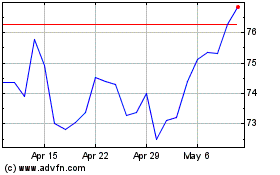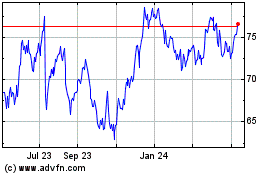Analysts Seek To Divine Which Banks Will Be Unchained By Fed
March 17 2011 - 5:00PM
Dow Jones News
For the 19 largest U.S. banks, formal notification Friday of
stress test results will mean some--not all--will be unchained from
restrictions on dividends or repaying bailout funds.
Banks can't--and the Fed won't--disclose the results of the
stress tests. But some boards will finally be free of restraints if
they are judged to have sufficient capital; some may announce plans
Friday or Monday.
Wall Street has been working overtime to figure out which banks
will take what actions.
Analysts broadly agree that J.P. Morgan Chase & Co. (JPM),
Wells Fargo & Co. (WFC), and US Bancorp (USB) will be among the
first of 19 to announce modest dividend increases after receiving
results of capital plans they submitted to the Fed in early
January.
Citigroup Inc. (C), on the other hand, has already said it won't
reinstall its dividend until next year.
This is the second round of special stress tests by the Fed
applying to those banks, which have been deemed systemically
important. The first round, in spring 2009, acted as a public
confidence-boosting exercise and the beginning point at which banks
could repay money they received from the Treasury Department's
Troubled Asset Relief Program.
Three big regional banks, KeyCorp (KEY), SunTrust Banks Inc.
(STI), Regions Financial Inc. (RF), still haven't repaid their TARP
funds, which they likely must do before boosting dividends. The
test is also expected to reveal how much capital they have to raise
to be allowed to repay the funds.
KeyCorp, considered by some analysts to have a good chance of
paying back its bailout funds, has said its capital plan submitted
to the Fed in accordance with the stress test included a proposal
to pay back its $2.5 billion outstanding TARP funds. KeyCorp has
said it is on more solid footing than some competitors so it
shouldn't have to raise much capital to repay the funds.
Fifth Third Bancorp (FITB), another large regional, has repaid
its TARP funds. Fifth Third Chief Financial Officer Daniel Poston
said at a conference earlier this month the bank intends to "return
in the near term" to a more normal dividend.
Some of the 19 likely to be granted permission for a dividend
raise, analysts say, include PNC Financial Services Group Inc.
(PNC), American Express Co. (AXP), Bank of New York Mellon Corp.
(BK) and State Street Corp. (STT).
BB&T Corp. (BBT) said earlier this month that it should be
in the first group approved for a dividend increase.
"By permitting selected banks to increase dividends, the Federal
Reserve is signaling the banking industry's capital strength has
made a remarkable comeback," Gerard Cassidy, a banking analyst with
RBC Capital Markets, said in a note to clients.
Banks are likely to restore dividends to payout ratios of 20% to
30% of earnings, according to analysts. J.P. Morgan CEO Jamie Dimon
said he hoped to achieve a payout ratio of 35% eventually, but
added "J.P. Morgan won't rush into anything."
For many banks, a dividend boost could be a welcome event for
investors knocked down by share price erosion in the last few
years. Bank of America Corp.'s (BAC) shares, at $13.98 on Thursday,
are down nearly 60% from June 2008. The bank has slashed its
dividend twice since the crisis in the autumn of 2008, cutting it
to 1 cent a quarter in March 2009.
Bank of America has said it doesn't plan a dividend increase
until the middle of 2011.
Card issuer Capital One Financial Corp. (COF) is likely to raise
its dividend in mid-2011, analysts say.
Investment banks Goldman Sachs Group Inc. (GS) and Morgan
Stanley (MS) aren't in the same category. Goldman Chief Financial
Officer David Viniar recently told analysts the firm is more
inclined to buy back its shares. Goldman is looking for a green
light from the Fed to pay back a $5 billion investment from Warren
Buffett's Berkshire Hathaway Inc. (BRKA, BRKB) made during the
financial crisis.
Morgan Stanley hasn't publicly discussed raising its dividend,
but is instead focused on buying from Citigroup the remaining stake
of its brokerage joint venture with Smith Barney and reallocating
its capital in client businesses.
MetLife Inc. (MET), the only insurer to be included in the
stress test, has historically paid an annual dividend in the fourth
quarter. But Chief Financial Officer Bill Wheeler said at an
investor conference in February the company couldn't move forward
on any capital management actions, including buybacks, until
passing the stress test. Assuming MetLife passes the stress test,
Wheeler said, "I think we'll be more aggressive on sort of an
annual dividend now and relatively less aggressive on buyback
activity."
The Wall Street Journal reported Thursday that Ally Financial,
the auto lender among the 19 largest banks, still on the hook for
billions in U.S. aid, won't get a definitive answer from the Fed
for some months.
-By Brett Philbin, Matthias Rieker, David Benoit, and Liz Moyer,
Dow Jones Newswires; 212-416-2173; brett.philbin@dowjones.com
--Erik Holm contributed to this article.
State Street (NYSE:STT)
Historical Stock Chart
From Jun 2024 to Jul 2024

State Street (NYSE:STT)
Historical Stock Chart
From Jul 2023 to Jul 2024
